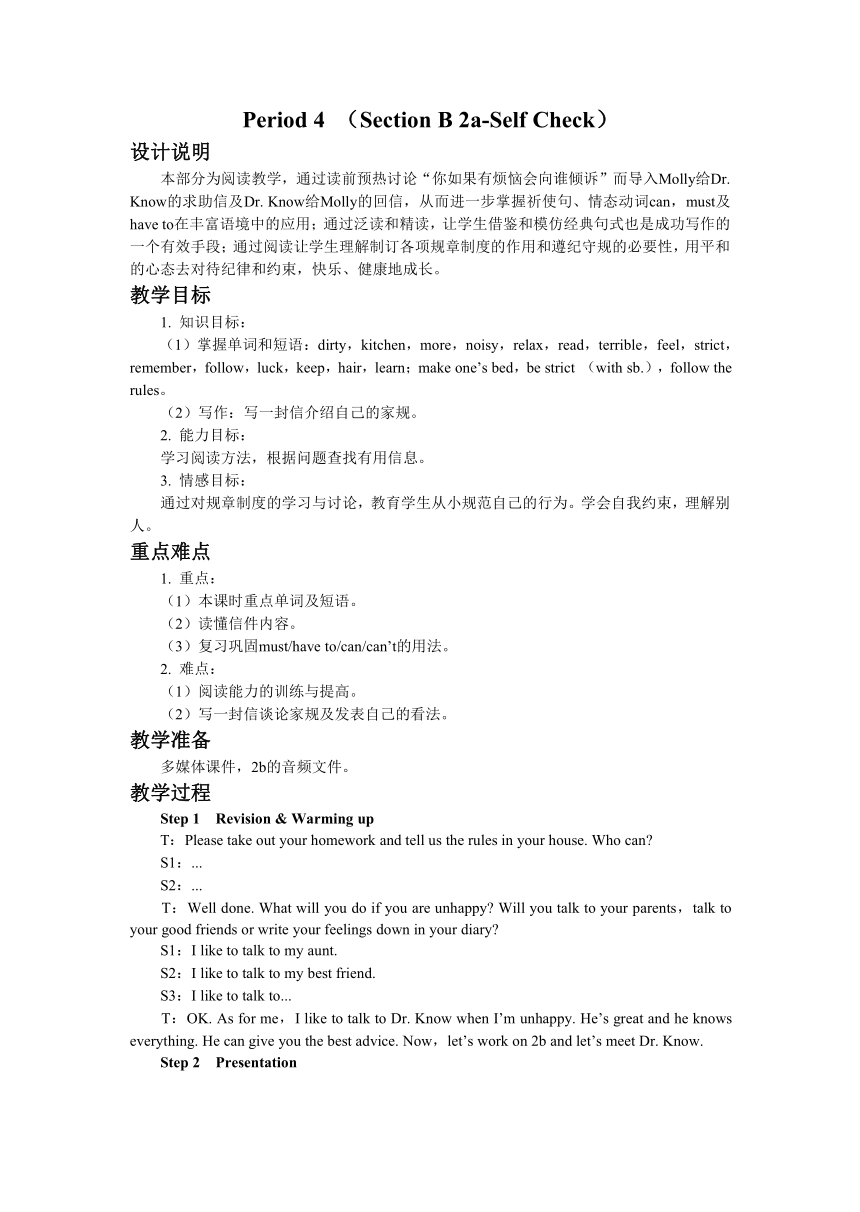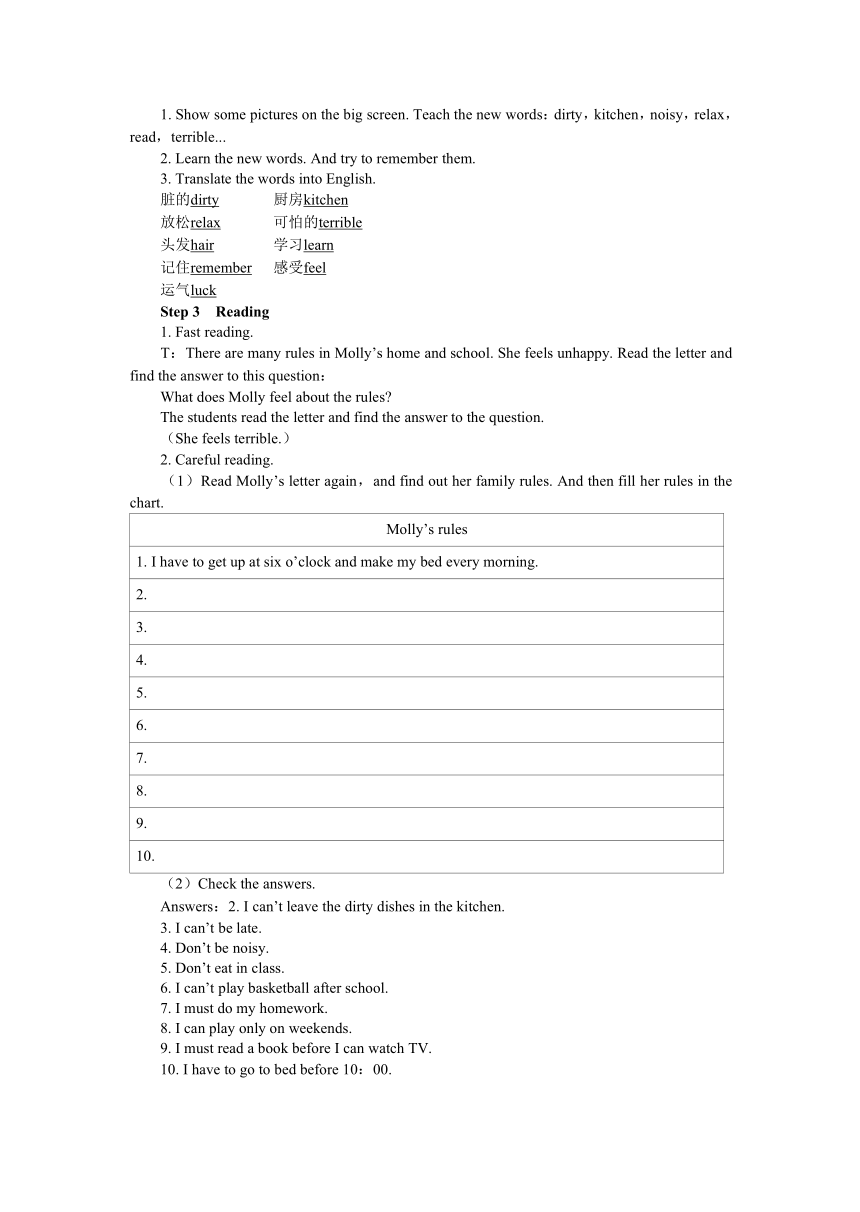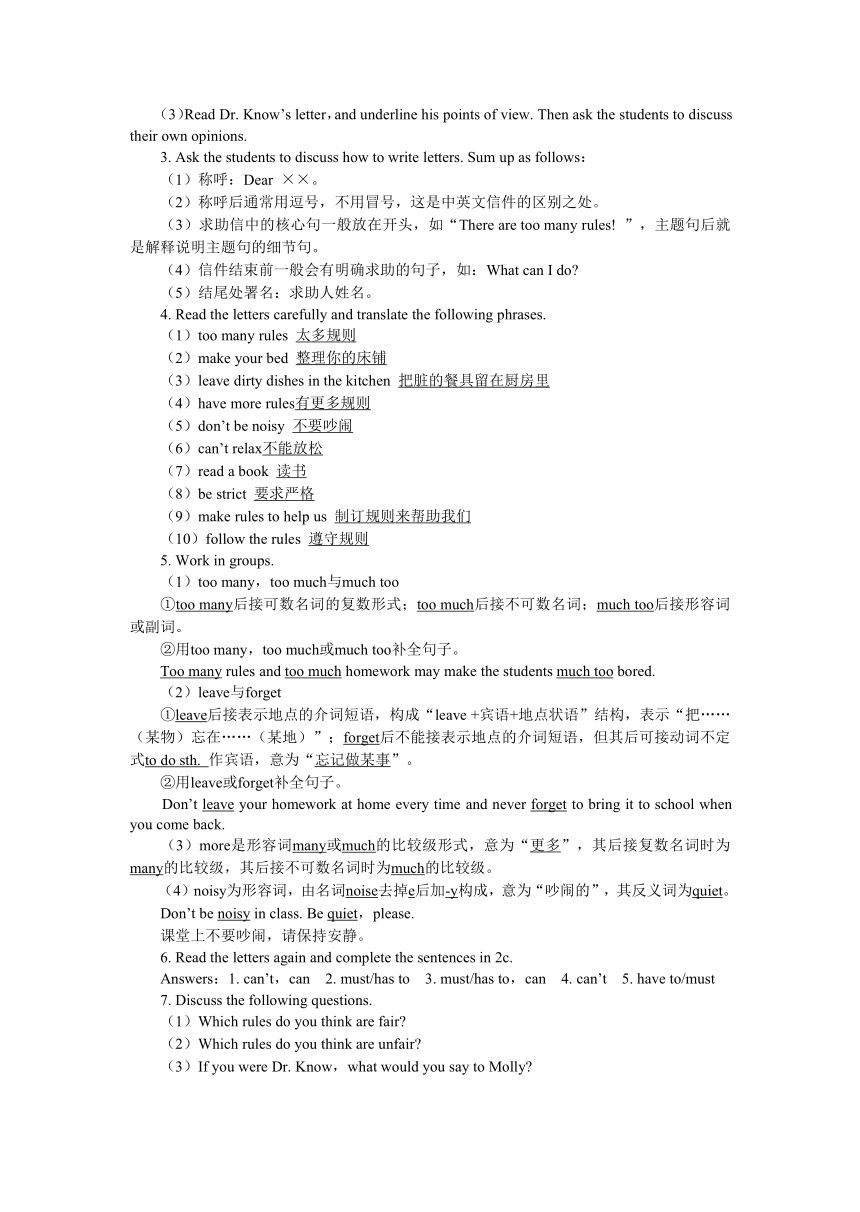教学详案 --人教版中学英语七年级(下)UNIT 4 Period 4 (Section B 2a-Self Check)
文档属性
| 名称 | 教学详案 --人教版中学英语七年级(下)UNIT 4 Period 4 (Section B 2a-Self Check) |

|
|
| 格式 | docx | ||
| 文件大小 | 29.8KB | ||
| 资源类型 | 试卷 | ||
| 版本资源 | 人教新目标(Go for it)版 | ||
| 科目 | 英语 | ||
| 更新时间 | 2024-02-21 00:00:00 | ||
图片预览



文档简介
Period 4 (Section B 2a-Self Check)
设计说明
本部分为阅读教学,通过读前预热讨论“你如果有烦恼会向谁倾诉”而导入Molly给Dr. Know的求助信及Dr. Know给Molly的回信,从而进一步掌握祈使句、情态动词can,must及have to在丰富语境中的应用;通过泛读和精读,让学生借鉴和模仿经典句式也是成功写作的一个有效手段;通过阅读让学生理解制订各项规章制度的作用和遵纪守规的必要性,用平和的心态去对待纪律和约束,快乐、健康地成长。
教学目标
1. 知识目标:
(1)掌握单词和短语:dirty,kitchen,more,noisy,relax,read,terrible,feel,strict,remember,follow,luck,keep,hair,learn;make one’s bed,be strict (with sb.),follow the rules。
(2)写作:写一封信介绍自己的家规。
2. 能力目标:
学习阅读方法,根据问题查找有用信息。
3. 情感目标:
通过对规章制度的学习与讨论,教育学生从小规范自己的行为。学会自我约束,理解别人。
重点难点
1. 重点:
(1)本课时重点单词及短语。
(2)读懂信件内容。
(3)复习巩固must/have to/can/can’t的用法。
2. 难点:
(1)阅读能力的训练与提高。
(2)写一封信谈论家规及发表自己的看法。
教学准备
多媒体课件,2b的音频文件。
教学过程
Step 1 Revision & Warming up
T:Please take out your homework and tell us the rules in your house. Who can
S1:...
S2:...
T:Well done. What will you do if you are unhappy Will you talk to your parents,talk to your good friends or write your feelings down in your diary
S1:I like to talk to my aunt.
S2:I like to talk to my best friend.
S3:I like to talk to...
T:OK. As for me,I like to talk to Dr. Know when I’m unhappy. He’s great and he knows everything. He can give you the best advice. Now,let’s work on 2b and let’s meet Dr. Know.
Step 2 Presentation
1. Show some pictures on the big screen. Teach the new words:dirty,kitchen,noisy,relax,read,terrible...
2. Learn the new words. And try to remember them.
3. Translate the words into English.
脏的dirty 厨房kitchen
放松relax 可怕的terrible
头发hair 学习learn
记住remember 感受feel
运气luck
Step 3 Reading
1. Fast reading.
T:There are many rules in Molly’s home and school. She feels unhappy. Read the letter and find the answer to this question:
What does Molly feel about the rules
The students read the letter and find the answer to the question.
(She feels terrible.)
2. Careful reading.
(1)Read Molly’s letter again,and find out her family rules. And then fill her rules in the chart.
Molly’s rules
1. I have to get up at six o’clock and make my bed every morning.
2.
3.
4.
5.
6.
7.
8.
9.
10.
(2)Check the answers.
Answers:2. I can’t leave the dirty dishes in the kitchen.
3. I can’t be late.
4. Don’t be noisy.
5. Don’t eat in class.
6. I can’t play basketball after school.
7. I must do my homework.
8. I can play only on weekends.
9. I must read a book before I can watch TV.
10. I have to go to bed before 10:00.
(3)Read Dr. Know’s letter,and underline his points of view. Then ask the students to discuss their own opinions.
3. Ask the students to discuss how to write letters. Sum up as follows:
(1)称呼:Dear ××。
(2)称呼后通常用逗号,不用冒号,这是中英文信件的区别之处。
(3)求助信中的核心句一般放在开头,如“There are too many rules! ”,主题句后就是解释说明主题句的细节句。
(4)信件结束前一般会有明确求助的句子,如:What can I do
(5)结尾处署名:求助人姓名。
4. Read the letters carefully and translate the following phrases.
(1)too many rules 太多规则
(2)make your bed 整理你的床铺
(3)leave dirty dishes in the kitchen 把脏的餐具留在厨房里
(4)have more rules有更多规则
(5)don’t be noisy 不要吵闹
(6)can’t relax不能放松
(7)read a book 读书
(8)be strict 要求严格
(9)make rules to help us 制订规则来帮助我们
(10)follow the rules 遵守规则
5. Work in groups.
(1)too many,too much与much too
①too many后接可数名词的复数形式;too much后接不可数名词;much too后接形容词或副词。
②用too many,too much或much too补全句子。
Too many rules and too much homework may make the students much too bored.
(2)leave与forget
①leave后接表示地点的介词短语,构成“leave +宾语+地点状语”结构,表示“把……(某物)忘在……(某地)”;forget后不能接表示地点的介词短语,但其后可接动词不定式to do sth. 作宾语,意为“忘记做某事”。
②用leave或forget补全句子。
Don’t leave your homework at home every time and never forget to bring it to school when you come back.
(3)more是形容词many或much的比较级形式,意为“更多”,其后接复数名词时为many的比较级,其后接不可数名词时为much的比较级。
(4)noisy为形容词,由名词noise去掉e后加-y构成,意为“吵闹的”,其反义词为quiet。
Don’t be noisy in class. Be quiet,please.
课堂上不要吵闹,请保持安静。
6. Read the letters again and complete the sentences in 2c.
Answers:1. can’t,can 2. must/has to 3. must/has to,can 4. can’t 5. have to/must
7. Discuss the following questions.
(1)Which rules do you think are fair
(2)Which rules do you think are unfair
(3)If you were Dr. Know,what would you say to Molly
The answers will vary.
Step 4 Writing
1. Complete Zhao Pei’s letter to Dr. Know in 3a using have to/must,can or can’t.
2. Check the answers.
Answers:Can;have to/must;have to/must,have to/must;can’t,have to/must;can’t,have to/must;can
3. Read the letter aloud and try to remember these expressions.
keep my hair short 留短发
learn to play the piano 学习弹钢琴
have fun过得快乐
4. T:We have many rules at home and school. Think about what things you have to do and what things you can’t plete the chart in 3b with the rules in your home and school. Write some of the rules and share them in class.
5. Write a letter to Dr. Know. Tell him about all the rules and how you feel about them.
[写作指导]
1. 先对3b中自己所写的在家及在校的规则进行整理,将在家里的规则及在学校里的规则分别放在一起。
2. 先将在家里的规则写成一段连贯的文字,再将在学校里的规则写成一段连贯的文字,之后表明自己对这些规则的感受。
3. 注意开头可写“Can you help me ”来表明自己求助的目的。并注意写清自己求助的原因。
4. 按书信的写作格式,写好开头及结尾,并将整个信件通读一遍。
One possible version:
Dear Dr. Know,
Can you help me I’m not happy because I have too many rules at home and school. I can’t meet my friends or watch TV after school. I have to do my homework every day. I have to go to bed before ten o’clock in the evening. I have to wear school uniforms on school days. I don’t like them because they’re ugly. I can’t eat in the classroom. I have to eat in the dining hall. I have to be quiet in the library.
I never have fun. What can I do
×××
Step 5 Self Check
1. Work on Exercise 1.
Fill in the blanks with the words.
Answers:arrive late;be noisy;listen to;is strict,follow the rules
2. Work on Exercise 2.
Use can,can’t,have to/must and don’t to write about the rules at school. Write two sentences for each rule.
Answers:2. Listen to the teacher. We must/have to listen to the teacher.
3. We must not be noisy in the library. We can’t be noisy in the library. Don’t be noisy in the library.
4. We must/have to speak English in English class.
5. Eat in the dining hall. We have to/must eat in the dining hall.
Step 6 Summary
In this lesson,we have learned:
1. New words:dirty,kitchen,more,noisy,relax,read,terrible,feel,strict,remember,follow,luck,keep,hair,learn.
2. Phrases:make one’s bed,be strict (with sb.),follow the rules.
3. Writing:A letter about family rules.
当堂达标(见导学案“当堂达标”)
答案与解析:
Ⅰ. 1. A be strict with“对……严格要求”;be afraid of“害怕”;be good at“擅长”;be late for“迟到”。根据句意可知,史密斯太太是一个好老师,她对她的学生要求很严格,故选A。
2. A too many“太多”,修饰可数名词复数。四个选项中只有A项为可数名词复数。句意为“厨房里有太多蔬菜”。
3. A 根据题干中的“你姐姐正在她房间里学习”可推断,不要“吵闹”,故填noisy“吵闹的”。
4. D leave意为“留下;落下”,常与表示地点的介词短语连用,构成“leave +宾语+地点状语”结构,表示“把某物落在某地”;本句主语是第三人称单数,因此选D。
5. B need作实义动词应在其后加to;can,must都是情态动词,变否定句时,可在其后直接加not。故选B项。
6. D 句意:汤姆,离开教室的时候记得关门。表示“记得去做某事”要用remember to do sth. ,故选D。
7. A 根据本题语境可知,为了我们的安全,去学校的路上我们必须“遵守”交通规则。故填follow。
8. C 题干中提到了“我希望我明天能够在英语演讲比赛中获胜”,由此可推断应祝对方好运,故选Good luck to you“祝你好运”。
Ⅱ. 1. does the dishes do the dishes“清洗餐具”。主语my father是第三人称单数,故填does the dishes。
2. go out go out“出去”。
3. in the kitchen in the kitchen“在厨房里”。
4. is strict with me be strict with sb.“对某人要求严格”。
5. keep your hair short keep one’s hair short “留短发”。
6. follow the rules follow the rules“遵守规则”。
7. learn to read learn to do sth.“学会做某事”。
8. before dinner before dinner“晚饭前”。
9. have fun have fun doing sth. 意为“做某事很开心”。
10. too much too much +不可数名词,意为“太多……”。
Ⅲ. 1. like 在中国,大多数校服都“像”运动服。表示“像”要用介词like。
2. between 它们真的适合学生运动,但女孩和男孩的校服之间没有区别!表示“在……和……两者之间”要用between...and...的搭配,故所缺的词是between。
3. their 这使得学生想穿“他们的”又酷又漂亮的衣服。所缺的词是their。
4. places 其他“地方”的学生是怎样应对校服的呢?表示“地方”要用place;再根据设空前的other可知,此处要填place的复数形式,即places。
5. wear 比如,一些学生“穿”不同颜色的袜子。所缺的词是wear。
6. interesting 来自韩国的一个13岁的女孩说那是让她穿着无聊的校服也能变得特别的一种“有趣的”方式。所缺的词是interesting。
7. usually 一些学生“通常”穿上面带有不同图案的袜子。所缺的词是usually。
8. hamburgers 澳大利亚的一名学生Milly最喜欢吃东西,所以在她的袜子上,我们可以看到“汉堡包”、蛋糕或其他食物。所缺的词是hamburgers。
9. well 校服不是太好看,但它们能帮助学生学“好”,并保持健康。所缺的词是well。
10. think 我们还可以“思考”一些让校服变得更时尚的方式,让我们自己显得更加与众不同。think about意为“思考;考虑”,所缺的词是think。
Step 7 Homework
1. Revise the new words and phrases in this unit.
2. Retell 2b.
板书设计
UNIT 4 Don’t eat in class. Period 4 (Section B 2a-Self Check)
dirty strict kitchen remember more follow noisy luck relax keep read hair terrible learn feel make one’s bed be strict(with sb.) follow the rules There are too many rules! Don’t leave the dirty dishes in the kitchen! But I have to go to bed before 10:00. After dinner,I can’t relax either. I have to/must keep my hair short.
教学反思
设计说明
本部分为阅读教学,通过读前预热讨论“你如果有烦恼会向谁倾诉”而导入Molly给Dr. Know的求助信及Dr. Know给Molly的回信,从而进一步掌握祈使句、情态动词can,must及have to在丰富语境中的应用;通过泛读和精读,让学生借鉴和模仿经典句式也是成功写作的一个有效手段;通过阅读让学生理解制订各项规章制度的作用和遵纪守规的必要性,用平和的心态去对待纪律和约束,快乐、健康地成长。
教学目标
1. 知识目标:
(1)掌握单词和短语:dirty,kitchen,more,noisy,relax,read,terrible,feel,strict,remember,follow,luck,keep,hair,learn;make one’s bed,be strict (with sb.),follow the rules。
(2)写作:写一封信介绍自己的家规。
2. 能力目标:
学习阅读方法,根据问题查找有用信息。
3. 情感目标:
通过对规章制度的学习与讨论,教育学生从小规范自己的行为。学会自我约束,理解别人。
重点难点
1. 重点:
(1)本课时重点单词及短语。
(2)读懂信件内容。
(3)复习巩固must/have to/can/can’t的用法。
2. 难点:
(1)阅读能力的训练与提高。
(2)写一封信谈论家规及发表自己的看法。
教学准备
多媒体课件,2b的音频文件。
教学过程
Step 1 Revision & Warming up
T:Please take out your homework and tell us the rules in your house. Who can
S1:...
S2:...
T:Well done. What will you do if you are unhappy Will you talk to your parents,talk to your good friends or write your feelings down in your diary
S1:I like to talk to my aunt.
S2:I like to talk to my best friend.
S3:I like to talk to...
T:OK. As for me,I like to talk to Dr. Know when I’m unhappy. He’s great and he knows everything. He can give you the best advice. Now,let’s work on 2b and let’s meet Dr. Know.
Step 2 Presentation
1. Show some pictures on the big screen. Teach the new words:dirty,kitchen,noisy,relax,read,terrible...
2. Learn the new words. And try to remember them.
3. Translate the words into English.
脏的dirty 厨房kitchen
放松relax 可怕的terrible
头发hair 学习learn
记住remember 感受feel
运气luck
Step 3 Reading
1. Fast reading.
T:There are many rules in Molly’s home and school. She feels unhappy. Read the letter and find the answer to this question:
What does Molly feel about the rules
The students read the letter and find the answer to the question.
(She feels terrible.)
2. Careful reading.
(1)Read Molly’s letter again,and find out her family rules. And then fill her rules in the chart.
Molly’s rules
1. I have to get up at six o’clock and make my bed every morning.
2.
3.
4.
5.
6.
7.
8.
9.
10.
(2)Check the answers.
Answers:2. I can’t leave the dirty dishes in the kitchen.
3. I can’t be late.
4. Don’t be noisy.
5. Don’t eat in class.
6. I can’t play basketball after school.
7. I must do my homework.
8. I can play only on weekends.
9. I must read a book before I can watch TV.
10. I have to go to bed before 10:00.
(3)Read Dr. Know’s letter,and underline his points of view. Then ask the students to discuss their own opinions.
3. Ask the students to discuss how to write letters. Sum up as follows:
(1)称呼:Dear ××。
(2)称呼后通常用逗号,不用冒号,这是中英文信件的区别之处。
(3)求助信中的核心句一般放在开头,如“There are too many rules! ”,主题句后就是解释说明主题句的细节句。
(4)信件结束前一般会有明确求助的句子,如:What can I do
(5)结尾处署名:求助人姓名。
4. Read the letters carefully and translate the following phrases.
(1)too many rules 太多规则
(2)make your bed 整理你的床铺
(3)leave dirty dishes in the kitchen 把脏的餐具留在厨房里
(4)have more rules有更多规则
(5)don’t be noisy 不要吵闹
(6)can’t relax不能放松
(7)read a book 读书
(8)be strict 要求严格
(9)make rules to help us 制订规则来帮助我们
(10)follow the rules 遵守规则
5. Work in groups.
(1)too many,too much与much too
①too many后接可数名词的复数形式;too much后接不可数名词;much too后接形容词或副词。
②用too many,too much或much too补全句子。
Too many rules and too much homework may make the students much too bored.
(2)leave与forget
①leave后接表示地点的介词短语,构成“leave +宾语+地点状语”结构,表示“把……(某物)忘在……(某地)”;forget后不能接表示地点的介词短语,但其后可接动词不定式to do sth. 作宾语,意为“忘记做某事”。
②用leave或forget补全句子。
Don’t leave your homework at home every time and never forget to bring it to school when you come back.
(3)more是形容词many或much的比较级形式,意为“更多”,其后接复数名词时为many的比较级,其后接不可数名词时为much的比较级。
(4)noisy为形容词,由名词noise去掉e后加-y构成,意为“吵闹的”,其反义词为quiet。
Don’t be noisy in class. Be quiet,please.
课堂上不要吵闹,请保持安静。
6. Read the letters again and complete the sentences in 2c.
Answers:1. can’t,can 2. must/has to 3. must/has to,can 4. can’t 5. have to/must
7. Discuss the following questions.
(1)Which rules do you think are fair
(2)Which rules do you think are unfair
(3)If you were Dr. Know,what would you say to Molly
The answers will vary.
Step 4 Writing
1. Complete Zhao Pei’s letter to Dr. Know in 3a using have to/must,can or can’t.
2. Check the answers.
Answers:Can;have to/must;have to/must,have to/must;can’t,have to/must;can’t,have to/must;can
3. Read the letter aloud and try to remember these expressions.
keep my hair short 留短发
learn to play the piano 学习弹钢琴
have fun过得快乐
4. T:We have many rules at home and school. Think about what things you have to do and what things you can’t plete the chart in 3b with the rules in your home and school. Write some of the rules and share them in class.
5. Write a letter to Dr. Know. Tell him about all the rules and how you feel about them.
[写作指导]
1. 先对3b中自己所写的在家及在校的规则进行整理,将在家里的规则及在学校里的规则分别放在一起。
2. 先将在家里的规则写成一段连贯的文字,再将在学校里的规则写成一段连贯的文字,之后表明自己对这些规则的感受。
3. 注意开头可写“Can you help me ”来表明自己求助的目的。并注意写清自己求助的原因。
4. 按书信的写作格式,写好开头及结尾,并将整个信件通读一遍。
One possible version:
Dear Dr. Know,
Can you help me I’m not happy because I have too many rules at home and school. I can’t meet my friends or watch TV after school. I have to do my homework every day. I have to go to bed before ten o’clock in the evening. I have to wear school uniforms on school days. I don’t like them because they’re ugly. I can’t eat in the classroom. I have to eat in the dining hall. I have to be quiet in the library.
I never have fun. What can I do
×××
Step 5 Self Check
1. Work on Exercise 1.
Fill in the blanks with the words.
Answers:arrive late;be noisy;listen to;is strict,follow the rules
2. Work on Exercise 2.
Use can,can’t,have to/must and don’t to write about the rules at school. Write two sentences for each rule.
Answers:2. Listen to the teacher. We must/have to listen to the teacher.
3. We must not be noisy in the library. We can’t be noisy in the library. Don’t be noisy in the library.
4. We must/have to speak English in English class.
5. Eat in the dining hall. We have to/must eat in the dining hall.
Step 6 Summary
In this lesson,we have learned:
1. New words:dirty,kitchen,more,noisy,relax,read,terrible,feel,strict,remember,follow,luck,keep,hair,learn.
2. Phrases:make one’s bed,be strict (with sb.),follow the rules.
3. Writing:A letter about family rules.
当堂达标(见导学案“当堂达标”)
答案与解析:
Ⅰ. 1. A be strict with“对……严格要求”;be afraid of“害怕”;be good at“擅长”;be late for“迟到”。根据句意可知,史密斯太太是一个好老师,她对她的学生要求很严格,故选A。
2. A too many“太多”,修饰可数名词复数。四个选项中只有A项为可数名词复数。句意为“厨房里有太多蔬菜”。
3. A 根据题干中的“你姐姐正在她房间里学习”可推断,不要“吵闹”,故填noisy“吵闹的”。
4. D leave意为“留下;落下”,常与表示地点的介词短语连用,构成“leave +宾语+地点状语”结构,表示“把某物落在某地”;本句主语是第三人称单数,因此选D。
5. B need作实义动词应在其后加to;can,must都是情态动词,变否定句时,可在其后直接加not。故选B项。
6. D 句意:汤姆,离开教室的时候记得关门。表示“记得去做某事”要用remember to do sth. ,故选D。
7. A 根据本题语境可知,为了我们的安全,去学校的路上我们必须“遵守”交通规则。故填follow。
8. C 题干中提到了“我希望我明天能够在英语演讲比赛中获胜”,由此可推断应祝对方好运,故选Good luck to you“祝你好运”。
Ⅱ. 1. does the dishes do the dishes“清洗餐具”。主语my father是第三人称单数,故填does the dishes。
2. go out go out“出去”。
3. in the kitchen in the kitchen“在厨房里”。
4. is strict with me be strict with sb.“对某人要求严格”。
5. keep your hair short keep one’s hair short “留短发”。
6. follow the rules follow the rules“遵守规则”。
7. learn to read learn to do sth.“学会做某事”。
8. before dinner before dinner“晚饭前”。
9. have fun have fun doing sth. 意为“做某事很开心”。
10. too much too much +不可数名词,意为“太多……”。
Ⅲ. 1. like 在中国,大多数校服都“像”运动服。表示“像”要用介词like。
2. between 它们真的适合学生运动,但女孩和男孩的校服之间没有区别!表示“在……和……两者之间”要用between...and...的搭配,故所缺的词是between。
3. their 这使得学生想穿“他们的”又酷又漂亮的衣服。所缺的词是their。
4. places 其他“地方”的学生是怎样应对校服的呢?表示“地方”要用place;再根据设空前的other可知,此处要填place的复数形式,即places。
5. wear 比如,一些学生“穿”不同颜色的袜子。所缺的词是wear。
6. interesting 来自韩国的一个13岁的女孩说那是让她穿着无聊的校服也能变得特别的一种“有趣的”方式。所缺的词是interesting。
7. usually 一些学生“通常”穿上面带有不同图案的袜子。所缺的词是usually。
8. hamburgers 澳大利亚的一名学生Milly最喜欢吃东西,所以在她的袜子上,我们可以看到“汉堡包”、蛋糕或其他食物。所缺的词是hamburgers。
9. well 校服不是太好看,但它们能帮助学生学“好”,并保持健康。所缺的词是well。
10. think 我们还可以“思考”一些让校服变得更时尚的方式,让我们自己显得更加与众不同。think about意为“思考;考虑”,所缺的词是think。
Step 7 Homework
1. Revise the new words and phrases in this unit.
2. Retell 2b.
板书设计
UNIT 4 Don’t eat in class. Period 4 (Section B 2a-Self Check)
dirty strict kitchen remember more follow noisy luck relax keep read hair terrible learn feel make one’s bed be strict(with sb.) follow the rules There are too many rules! Don’t leave the dirty dishes in the kitchen! But I have to go to bed before 10:00. After dinner,I can’t relax either. I have to/must keep my hair short.
教学反思
同课章节目录
- Unit 1 Can you play the guitar?
- Section A
- Section B
- Unit 2 What time do you go to school?
- Section A
- Section B
- Unit 3 How do you get to school?
- Section A
- Section B
- Unit 4 Don't eat in class.
- Section A
- Section B
- Unit 5 Why do you like pandas?
- Section A
- Section B
- Unit 6 I'm watching TV.
- Section A
- Section B
- Review of Units 1-6
- Unit 7 It's raining!
- Section A
- Section B
- Unit 8 Is there a post office near here?
- Section A
- Section B
- Unit 9 What does he look like?
- Section A
- Section B
- Unit 10 I'd like some noodles.
- Section A
- Section B
- Unit 11 How was your school trip?
- Section A
- Section B
- Unit 12 What did you do last weekend?
- Section A
- Section B
